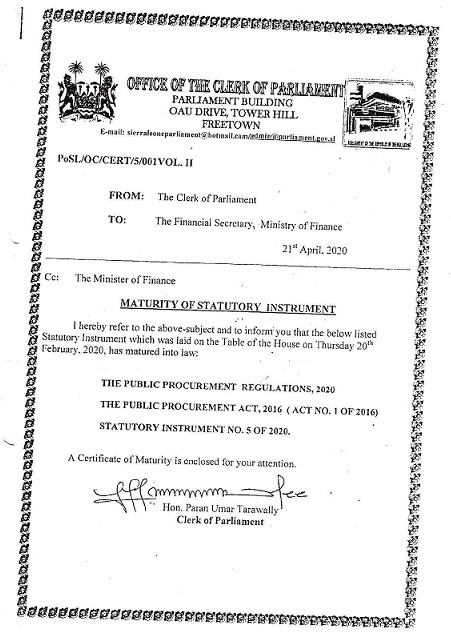By Allieu Sahid Tunkara
The Public Procurement Regulations 2020 has become law having gone through parliamentary scrutiny.
The disclosure was made by the head of National Public Procurement Authority (NPPA), Ibrahim Brima Swarray.
By law, the Public Procurement Regulations of 2006, the first Procurement Regulation has been repealed by the new 2020 Regulation.
This means, the former is now null and void owing to the promulgation of the latter.
The NPPA Chief who laid the foundation for the passage of the new law sees the simultaneous existence of the 2016 Act and the 2020 Regulations as a challenge.
“The situation has always brought disparity in most of the activities managed by ministries, departments and agencies and even the regulatory body,” he said.
The NPPA Chief also stated that the 2016 Act was not relating properly to the 2016 regulations.
“The 2016 Act cannot be interpreted properly using the 2006 Regulations,” the NPPA Chief emphasised.
Mr Swarray also told this medium that the 2016 Act came into being after assessments and additions were made into it and that the 2006 Regulation was not diving with the 2016 Act.
The NPPA Chief thus sees the new law as the best to interpret the 2016 Act.
“Now that you have the 2020 Public Procurement Regulations and the 2016 Act, the 2020 regulation best explains the 2016 Act,” he emphasised.
He said with the new Procurement Regulation, the explanation of sole sourcing during emergencies was made clear.
Before this time, the NPPA Chief, went on, auditors had problems with practising procurement officers since they relied on the 2006 Procurement Regulation.
The NPPA Chief justified his claim by making reference to a recent Audit Service Sierra Leone news release in which the 2006 Regulations was quoted.
Over the years, the 2006 Procurement Regulations was used to explain the 2016 Act thereby creating legal lacunae in the field of procurement.
With the passage of the 2020 Public Procurement Regulations the lacunae which previously existed has been solved as the new regulations now sufficiently explain the NPPA Act of 2016 which is the principal law.
The NPPA came into being through Act of Parliament of 2004 that has a regulation in 2006.
However, the Act of 2004 was repealed by the 2016 Act meaning that the 2004 was automatically obsolete, by extension the 2006 Regulations.
Consequently, there were a lot of additions in the 2016 Act that were not captured in 2006 Regulations and this brings huge disparity between the two laws.
The legal disparity was seen as one of the anomalies that created challenges, over the years, for practising procurement officers.
